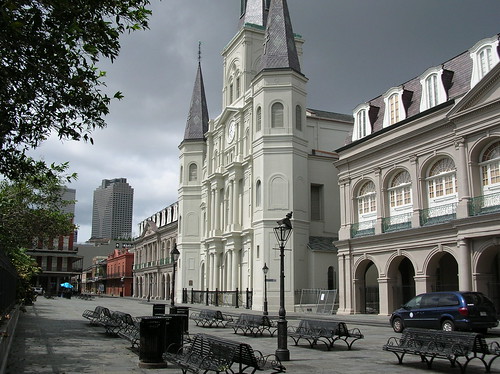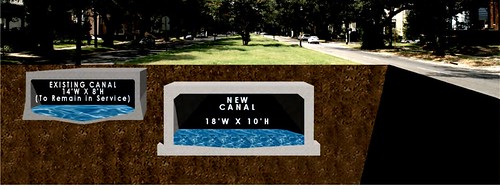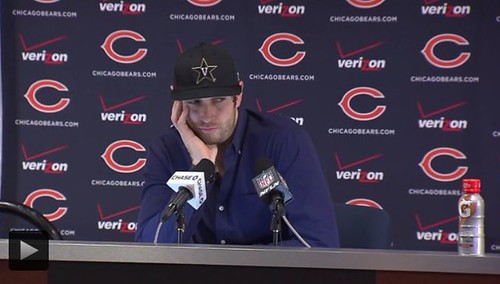Anyway, this is as terrible as you might expect.
Scalise’s initial assertion that he didn’t know about EURO’s background when he spoke to the group — reportedly about tax policy — is hard to believe. We’re more encouraged by Scalise’s later, less equivocal statement of regret about accepting a speaking engagement from extremists."Foster governed well." From what I can tell the Advocate's criteria for good governance pretty much ends at unindicted.... although I suspect there are bonus points for whiteness. Certainly there are big points for being powerful. And Scalise was well on his way up the ladder there.
Scalise certainly isn’t the first politician who’s kept company with odious characters. During his first race for governor, Mike Foster’s campaign purchased mailing lists from Duke. Despite that lapse, Foster governed well for two terms.
For kicks, the unsigned Voice Of God editorial offers us Jeremiah Wright as presumably a David Duke equivalent proving, again, that this paper has no moral compass.. or common sense... whatsoever.
Perhaps the more compelling precedent concerns President Barack Obama, who, before he became president, was a member of a church pastored by the Rev. Jeremiah Wright, a cleric whose toxic pronouncements included the suggestion that Americans somehow prompted the Sept. 11, 2001, terrorist attacks because of aggressive foreign policy.Ummmm, yes. 9-11 was unquestionably blowback... enacted, of course, by murderous zealots.. but encouraged by decades of disastrous, imperialistic US foreign policy. This fact does not exonerate terrorists by any means, but it is nonetheless unassailably true.
But just that someone would think to equate Wright with David Duke is astoundingly ignorant.
Here is a Bill Moyers interview with Jeremiah Wright from 2008. I would encourage the invisible person responsible for the Advocate editorial to watch the whole thing. But here is a passage where Moyers asks Wright to talk directly about the problem of a misinformed or half-informed American historical understanding.
BILL MOYERS: What is your notion of why so many Americans seem not to want to hear the full Monty - they don't want to seem to acknowledge that a nation capable of greatness is also capable of cruelty?From the particular hermeneutic through which the official company editorial page of The Advocate views matters, Rev Wright and David Duke are pretty much the same thing.
REVEREND WRIGHT: I think I come at that as a historian of religion. That we are miseducated as a people. Or because we're miseducated, you end up with the majority of the people not wanting to hear the truth. Because they would rather cling to what they are taught. James Washington, now a deceased church historian, says that after every revolution, the winners of that revolution write down what the revolution was about so that their children can learn it, whether it's true or not. They don't learn anything at all about the Arawak, they don't learn anything at all about the Seminole, the Cheek-Trail of Tears, the Cherokee. They don't learn anything. No, they don't learn that. What they learn is 1776, Crispus Attucks was the one black guy in there. Fight against the British, the- terrible. "We hold these truths to be self-evident that all men are created equal while we're holding slaves." No, keep that part out. They learn that. And they cling to that. And when you start trying to show them you only got a piece of the story, and lemme show you the rest of the story, you run into vitriolic hatred because you're desecrating our myth. You're desecrating what we hold sacred. And when you're holding sacred is a miseducational system that has not taught you the truth. I also think people don't understand condemn, D-E-M-N, D-A-M-N. They don't understand the root, the etymology of the word in terms of God condemning the practices that are against God's people. But again, what is happening is I talk a truth. Reading the scripture or the hermeneutic of a people who have-
BILL MOYERS: Hermeneutic?
REVEREND WRIGHT: Hermeneutic is an interpretation, it's the window from which you're looking is your hermeneutic. And when you don't realize that I've been framed- this whole thing has been framed through this window, there's another world out here that I'm not looking at or taking into account, it gives you a perspective that-- that is-- that is informed by and limited by your hermeneutic. Dr. James Cone put it this way. The God of the people who riding on the decks of the slave ship is not the God of the people who are riding underneath the decks as slaves in chains. If the God you're praying to, "Bless our slavery" is not the God to whom these people are praying, saying, "God, get us out of slavery." And it's not like Notre Dame playing Michigan. You're saying flip a coin; hope God blesses the winning team, no. That the perception of God who allows slavery, who allows rape, who allows misogyny, who allows sodomy, who allows murder of a people, lynching, that's not the God of the people being lynched and sodomized and raped, and carried away into a foreign country. Same thing you find in Psalm 137. That those people who are carried away into slavery have a very different concept of what it means to be the people of God than the ones who carried them away.
BILL MOYERS: And they say, "How can we sing the song of the Lord of a foreign land?"
REVEREND WRIGHT: Correct.
It's nice that they still print 7 days but maybe you really shouldn't read all of that paper.















